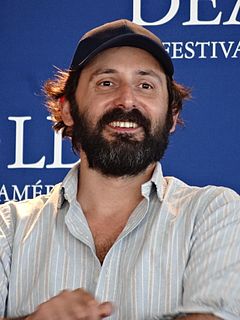A Quote by Paul Goodman
Naturally, grown-up citizens are concerned about the beatniks and delinquents. ... The question is why the grownups do not, more soberly, draw the same conclusions as the youth. Or, since no doubt many people are quite clear about the connection that the structure of society that has becoming increasingly dominant in our country is disastrous to the growth of excellence and manliness, why don't more people speak up and say so?
Quote Topics
About
Becoming
Citizens
Clear
Concerned
Conclusions
Connection
Country
Delinquents
Disastrous
Dominant
Doubt
Draw
Excellence
Grown
Grown-Up
Grownups
Growth
Increasingly
Manliness
Many
More
More People
Naturally
No Doubt
Our
Our Country
People
Question
Quite
Same
Say
Since
Society
Speak
Structure
Up
Why
Youth
Related Quotes
You couple that with how I looked when I was younger, and growing up... The voice is not quite breaking. It's awful. No, I don't enjoy that at all. But that's one of the things people love and find so endearing about the Harry Potter series, and why they've lasted so long. Because people have grown up with us, and they care about the characters. They're not just some characters in the film, they're people you can relate to, and you care about, and you grew up with, and when they die in this film, people feel it!
I'm in bed, so to speak, more with those people who consider themselves atheists but who are concerned about the same things, ideas, and politics I'm concerned with than those who claim to be religious in the same way that I am but have no interest in the political reorganization of society, which needs to be talked about from the pulpit.
When I find too many puzzles about the way explanations are given about why there is inequality - why people who work the hardest in the world end up being the poorest - I can't just sit back and not try to understand why the gaps between people are increasing, or why there are so many homeless and hungry people in the world.
You have a huge number of people who spend their time writing papers which show that migrants pay more to the country than they take out in benefits, and they say, "Why don't you approve of migration? Why don't you open up borders?" They're not able to empathize with how people feel about migration.
I think that in the first place, why we can get excited about [Buckminster ] Fuller, why it's plausible that people might - why my publisher would publish this book [You belong to the universe] about it long after he's dead and irrelevant by many standards has to do with the fact that he was in a sense coming up with this job for himself that is the job that we now refer to when we speak about world change.
Many people are concerned with children of India, with the children of Africa where quite a few die of hunger, and so on. Many people are also concerned about the violence in this great country of the United States. These concerns are very good. But often these same people are not concerned with the millions being killed by the deliberate decision of their own mothers. And this is the greatest destroyer of peace today- abortion which brings people to such blindness.
I've heard plenty of Christians try to answer the why question by going back to the what. "You have to believe because Jesus is the Son of God." But that's answering the why with more what. Increasingly we live in a time in which you can't avoid the why question. Just giving the what (for example, a vivid gospel presentation) worked in the days when the cultural institutions created an environment in which Christianity just felt true or at least honorable. But in a post-Christendom society, in the marketplace of ideas, you have to explain why this is true, or people will just dismiss it.
I think sometimes it's sort of easier to be playing a role based on a real person because there's quite often a lot more information, you're not making it up, it's there in books, it's there in research form. But really the questions you ask about the character, and why people behave, and where they come, and how they've ended up in the places they've ended up are the same.
It's to come up with a deal that both sides feel they can live with. And I think that that's probably where we're going to end up. I think that Donald Trump has people working for him who are ultimately deal-makers. And the Canadians are the same way. They're grownups about this. That's why you saw the prime minister of Canada, Justin Trudeau not respond to Trump with the same rhetoric, but to talk about the strength of the relationship and the desire for a deal.
Chinese people become jealous about status more easily. Foreigners are more inclined to look up to successful people. I don't understand why there is a difference. If two people start at the same point and then one person gets ahead, the other should work hard to catch up. But instead, they just curse. They are jealous.
Well, years and years ago, I started to ask myself three very simple questions, which dominated my life for many years. One of them was, "Why are organizations everywhere, whether commercial, social, or religious, increasingly unable to manage their affairs?" The second question was, "Why are individuals throughout the world increasingly in conflict with and alienated from the organizations of which they're a part?" And the third was, "Why are society and the biosphere increasingly in disarray?"
Typically, people who exercise start eating better and becoming more productive at work. They smoke less and show more patience with colleagues and family. They use their credit cards less frequently and say they feel less stressed. It's not completely clear why. But for many people, exercise is a keystone habit that triggers widespread change.
Failures are much more dramatic than successes, and people like drama. I think this is why automobile races draw such crowds. People expect spectacular crashes, which we tend to find more interesting than cars just racing around the track. The same is true of bridges, buildings, or any structure or machine.
We no longer just take religious identity from our parents, so what's going on? Why are people going to this series, why are people reading so many books about religion? It's because they want answers. The answers are no longer just passed down from generation to generation. It's harder for people. In effect, you have to roll up your sleeve and ask the questions. But if you do it, if you forge your own identity, it can be much more personal and much more meaningful to you.
A real good artist is basically a grown-up kid, who never kills the kid. What we call being an adult is basically about killing the kid. People think you have to forget about the kid to become an adult and deal with grown-up problems. But, that's bullshit. We are still kids. It's the same, you just grow up. You're a kid with more experience.






































